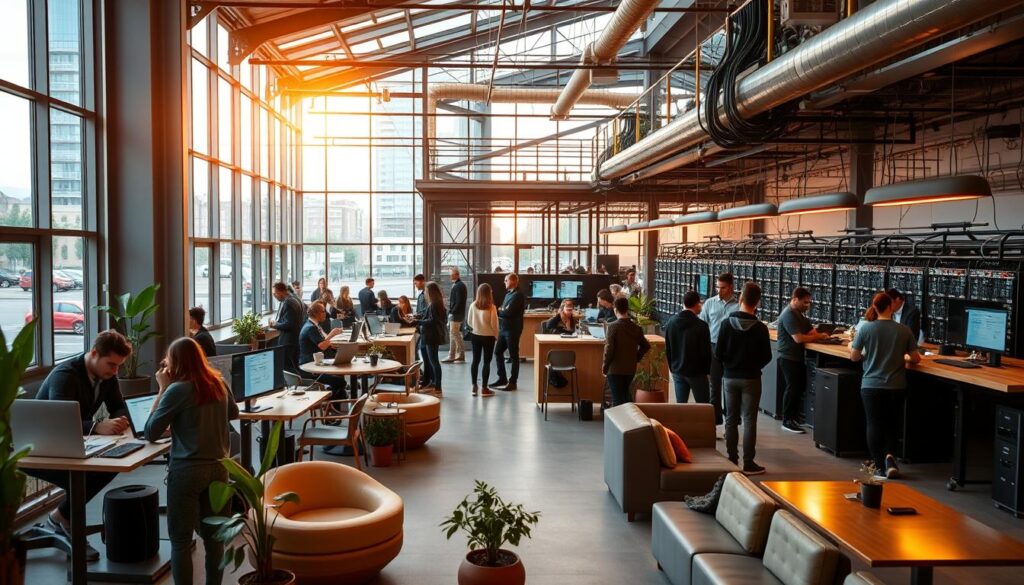Austria is a great place for remote businesses because of its friendly laws and business environment. Cities like Vienna, Graz, and Linz have low startup costs and fast internet. They also offer easy access to Europe’s markets.
Entrepreneurs can get visas like the Freelance Visa or Red-White-Red Card. This makes moving to Austria easier.
Remote workers in Austria spend between $2,120 and $2,650 a month on average. The country’s internet speeds are fast, averaging 62.61 Mbps download. This ensures reliable connectivity for work.
Groups like the Austrian Federal Economic Chamber (WKO) and WIFO help home-based startups. Crowdfunding platforms like Startnext also support funding needs.
Austria ranks high in the Global Entrepreneurship Index. The government offers grants, and major cities have co-working spaces. Knowing the Local Business-Friendly Laws helps entrepreneurs grow and comply in this supportive environment.
Contents
- 1 Introduction to Remote Business Opportunities in Austria
- 2 Understanding Local Business-Friendly Laws
- 3 Top Cities for Remote Businesses in Austria
- 4 Cost of Living Vs. Business Costs in Austria
- 5 Access to Resources and Infrastructure
- 6 Networking Opportunities for Local Businesses
- 7 Success Stories of Remote Businesses in Austria
- 8 Conclusion: Why Austria is a Great Choice for Remote Businesses
- 9 Source Links
Introduction to Remote Business Opportunities in Austria
Austria is becoming a top spot for remote businesses. This is thanks to its business-friendly policies and updated small business legislation. The country has fast internet and easy access to the EU. It offers a good balance of cost and quality of life.
Starting a new business or moving your operations here is supported. Austria’s environment is great for entrepreneurs from around the world.
Why Choose Austria?
- Visa flexibility: Options like the Self-Employment Visa and Red-White-Red Card make it easy for skilled workers to live here.
- Employee perks: Workers get 5 weeks of paid vacation, plus extra monthly payments.
- Corporate advantages: Corporate tax rates are falling to 23% by 2024, and there’s no trade tax.
- Workforce quality: The population is well-educated, with great vocational training.
Overview of Remote Business Trends
Austria’s remote work scene is growing fast. The government supports digital innovation. This includes online business registration and the 2024 FlexCo entity for startups.
Big cities like Vienna and Graz have lots of co-working spaces and startup hubs. Remote workers also enjoy easier rules, like digital notary services since 2022. These changes make Austria a key player in EU digital transformation.
Understanding Local Business-Friendly Laws
Starting a remote business in Austria means knowing local rules. Each city has its own rules, from permits to zoning. These rules help local businesses grow.

Key Regulations to Consider
- Local regulations in Vienna make starting a digital business easy with online platforms.
- Vienna’s municipality ordinances give tax breaks to tech startups.
- Graz’s community regulations support eco-friendly businesses with grants and zoning perks.
- Linz requires tech businesses to follow EU digital privacy laws.
Benefits of Business-Friendly Laws
These laws make things easier. For instance:
- Vienna’s quick 3-day business registration.
- Graz’s community regulations reduce green business permit costs by 40%.
- Nationwide tax breaks for R&D investments.
Resources for Understanding Laws
| Resource | Description | Website |
|---|---|---|
| Austrian Business Agency | Free legal guides and visa support for non-EU entrepreneurs | oeba.at |
| Economic Chamber (WKO) | Industry-specific compliance checklists | wko.at |
| Municipal Offices | City-specific municipality ordinances databases | Search [City Name] + “Gewerbeaufsicht” |
These resources help with permits, labor laws, and taxes. They make starting a business smoother.
Top Cities for Remote Businesses in Austria
When picking a city in Austria for your remote business, think about city zoning laws and town ordinances. Here’s a look at Austria’s top three cities for remote workers.
Vienna: The Capital of Innovation
Vienna is a leader with over 100 coworking spaces. The Furniture Cafe and Propeller offer fast internet. Its city zoning laws support tech and creative fields, with tax breaks in innovation areas.
Private offices start at €250/month, and coworking desks from €99/month.
Graz: A Hub for Startups
Graz makes starting a business easy, ranking 7th globally. It has coworking spaces like Hub Graz and cultural events for networking.
Linz: The Silicon Valley of Austria
Linz’s tech scene grows thanks to flexible zoning. It’s home to IT and green tech firms. The New City Hall district and Digital Hub Linz offer innovation and free workshops.
| City | Internet Speed (MBPS) | Monthly Rent (Studio, city center) | Zoning/Tax Benefits |
|---|---|---|---|
| Vienna | 135.3 download | €250-€350 | Tech incentives, innovation zones |
| Graz | 105.8 download | €200-€300 | Startup grants, streamlined permits |
| Linz | 112.4 download | €180-€280 | Tech tax breaks, R&D subsidies |
Cost of Living Vs. Business Costs in Austria
Starting a remote business in Austria means managing personal and business expenses. The favorable business environment here has lower costs than big European cities. This makes Austria a great spot for entrepreneurs.
Cost of Living Breakdown
Rent prices change depending on where you are. A 1-bedroom in Vienna’s center costs €741–€1,013 a month. For an 85m² home, utilities average €312 a month.
Food is affordable: milk is €1.50/liter, chicken fillets €13/kg, and a 10GB mobile plan starts at €10.50. Public transport is cheap too—€2.55 for a single ticket or €51 for unlimited travel a month.
Average Business Expenses Table
| Expense | Cost Range |
|---|---|
| Co-working space (monthly) | €160–€370 |
| Internet (60+ Mbps) | €32/month |
| Office rental (per m²) | €30–€60 |
Vienna’s co-working spaces start at €15/day. This is cheaper than Berlin or London, where prices are 30% higher. Austria’s Local Business-Friendly Laws make starting a business easier and cheaper. The 25% corporate tax rate and simple rules also help keep costs down.
Family expenses go up as your family grows. A family of four spends €800–€1,000 on food. Schools like Vienna International School cost €15,000–€28,000 a year. But, public schools are more affordable. With low startup costs and a supportive environment, Austria is a wise choice for remote businesses.
Access to Resources and Infrastructure

Vienna’s town ordinances make sure there are reliable fiber-optic networks. Cities like Graz and Linz focus on expanding broadband. These efforts help remote teams work smoothly.
Public transit in big cities makes it easy to get to workspaces. This cuts down on travel problems.
Importance of Good Infrastructure
Fast internet and easy-to-get-to workspaces are key for remote businesses. Austria’s cities are ahead in this area. Vienna has download speeds of 135.3 Mbps, while Salzburg has 15.6 Mbps.
Innsbruck is a standout because of its partnerships. Adler’s Hotel offers workspaces with fast internet. Good infrastructure means less waiting and more trust from clients.
Digital and Co-Working Spaces
Vienna is known for its co-working spots. The Furniture Cafe costs €15 a day and has speeds of 228.43 Mbps. Propeller workspace offers 306 Mbps for €250 a month for a desk.
These spaces do well because of local rules that support mixed-use development. Unlike the U.S., where over 30 million lack fast internet, Austria is upgrading its networks.
- Vienna: 135.3 Mbps download (Salzburg: 15.6 Mbps)
- Propeller workspace: 306 Mbps download speeds
- Innsbruck’s Adler’s Hotel: Rated top for hybrid work setups
For the latest on town ordinances and co-working spots, visit austria.gv.at. Austria’s investment in infrastructure keeps remote teams connected and productive.
Networking Opportunities for Local Businesses
Austria’s municipality ordinances and small business legislation help remote entrepreneurs meet local pros. Cities like Vienna and Graz have events that match regional policies. This helps businesses grow by working together.
In Vienna, the Business Agency and in Graz, the Startup Hub are great for meetings and partnerships. Salzburg might have less nightlife, but it has daytime workshops and co-working sessions. Local governments help by funding events and working with private groups. This creates a place where businesses can build strong relationships.
Business Networks and Communities
- Vienna: City of Vienna sponsors monthly mixer events for entrepreneurs.
- Graz: Styria Chamber of Commerce runs quarterly tech meetups.
- Linz: Linz Innovation Hub offers weekly mentorship circles.
Local Events and Workshops
Workshops on digital marketing and finance are common, thanks to small business legislation. The WU Executive Academy in Vienna has free sessions for businesses.
| City | Initiatives | Ordinances | Resources |
|---|---|---|---|
| Vienna | Quarterly innovation summits | §12 Business Support Act | Event calendar |
| Graz | Startup incubator programs | Regional Collaboration Law | Grant portal |
| Linz | Industry-specific roundtables | Local Partnership Directive | Directory |
Salzburg’s quiet winters are filled with online forums and virtual meetups. This means businesses can find opportunities all year round. By exploring these options, businesses can better understand and enter local markets.
Success Stories of Remote Businesses in Austria
Remote entrepreneurs do well in Austria’s favorable business environment. They use flexible city zoning laws to their advantage. Let’s see how these help across different industries.
Notable Remote Entrepreneurs
In Vienna, Personal Growth Base makes over $10,000 a month with life coaching. This is thanks to low startup costs and Austria’s 33% growth in this field since 2015. On the other hand, Meister Labs in Linz created a $10M ARR team collaboration tool. This was helped by Austria’s 16% higher labor productivity than the EU average.
- 3D animation studios in Graz earn $10K–$62.5K a month. They get help from Austria’s R&D incentives.
- MaidThis Franchise, an eco-friendly cleaner, reached $100K monthly revenue after just $800. It thrives in Austria’s green economy.
Testimonials and Case Studies
One remote worker gave Vienna 3/5 stars, liking its architecture but preferring shorter stays. Yet, its favorable business environment attracts many. 98% of employees enjoy collective bargaining protections, and 74% of schools offer vocational training. This makes hiring easier.
Look at industries like VR healthcare ($20K–$50K/month) or digital infrastructure. Austria’s 23% corporate tax rate and central EU location help businesses grow. These stories show that Vienna, despite its fast pace, offers great opportunities for growth.
Conclusion: Why Austria is a Great Choice for Remote Businesses
Austria is perfect for remote entrepreneurs because of its local regulations and business-friendly policies. Cities like Vienna, Graz, and Linz have great internet speeds, making work easy. The country’s strong economy supports many industries, including tech and healthcare.
Remote workers find it easy to set up thanks to Austria’s stable laws. The “Digital Agenda 2030” aims to grow tech, drawing in talent from around the world.
Final Thoughts on Local Business Laws
Austria’s local regulations are clear, making it easy to follow the rules. The country’s labor laws protect workers and offer flexibility. For example, there are good parental leave policies and tech salaries can reach up to $140,000 a year.
Collective bargaining agreements and a multilingual workforce make things easier. The Austrian Business Agency helps with permits and taxes, making it easier to grow your business.
Encouragement to Explore Opportunities
Austria is full of opportunities, from renewable energy to software development. Tech companies like Dynatrace thrive in Vienna. Healthcare and education tech also have great potential, with earnings up to $50,000 a month.
Co-working spaces are affordable, and living costs are low. This makes it easy to scale your business. Plus, Austria’s location in central Europe opens doors to EU markets. Start exploring now to take advantage of these opportunities.
Source Links
- https://neubase.co/blog/remote-us-company-from-austria/
- https://20countries.com/blog/home-based-start-ups-in-austria/
- https://www.recruiterslineup.com/guide-to-hiring-employees-in-austria/
- https://investinaustria.at/en/doing-business/starting-a-business-in-austria/
- https://harris-sliwoski.com/blog/doing-business-in-the-united-states-the-laws-you-should-know/
- https://www.fundera.com/blog/government-regulations-on-business
- https://standtogether.org/stories/the-economy/these-states-are-simplifying-regulations-for-economic-growth
- https://www.skuad.io/blog/20-best-cities-for-remote-work
- https://expatriateconsultancy.com/best-cities-for-remote-workers/
- https://relocate.me/cost-of-living/austria/vienna
- https://www.bmaw.gv.at/en/Topics/Business-Location/Location-Business-Policy.html
- https://bidenwhitehouse.archives.gov/build/guidebook/
- https://www.govpilot.com/blog/municipality-led-local-economic-development
- https://govos.com/blog/building-a-business-friendly-local-government/
- https://www.govpilot.com/blog/why-supporting-local-businesses-is-vital-govpilot
- https://20countries.com/blog/12-businesses-to-setup-in-austria/
- https://www.advantageaustria.org/tr/files/ABA_Business_Location_Austria._Broschure.pdf
- https://www.rivermate.com/guides/austria
- https://blog.9cv9.com/a-comprehensive-guide-to-hiring-employees-in-austria-for-2025/
- https://www.omnipresent.com/articles/what-are-the-legal-and-tax-risks-of-remote-employees-working-from-abroad


